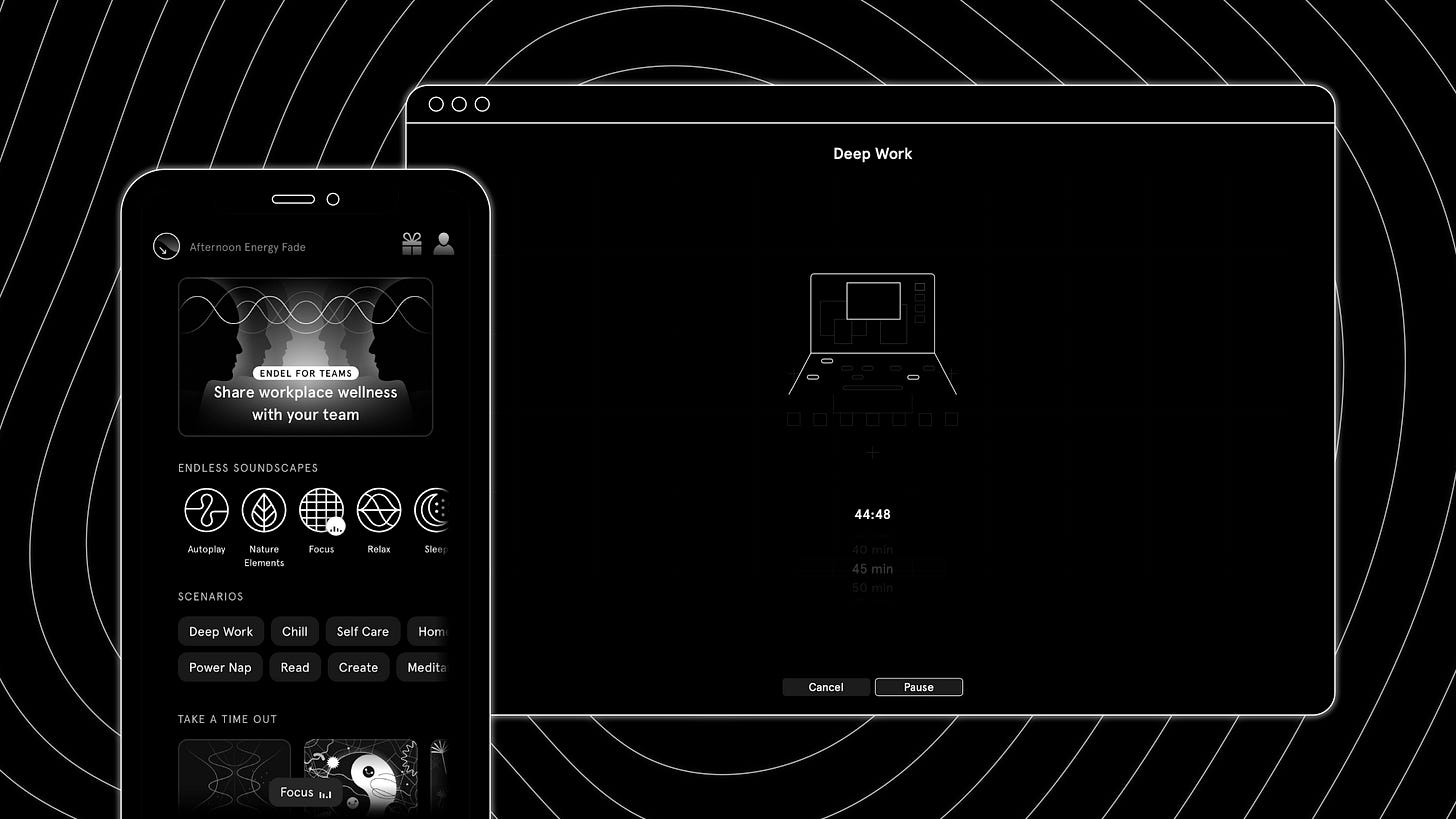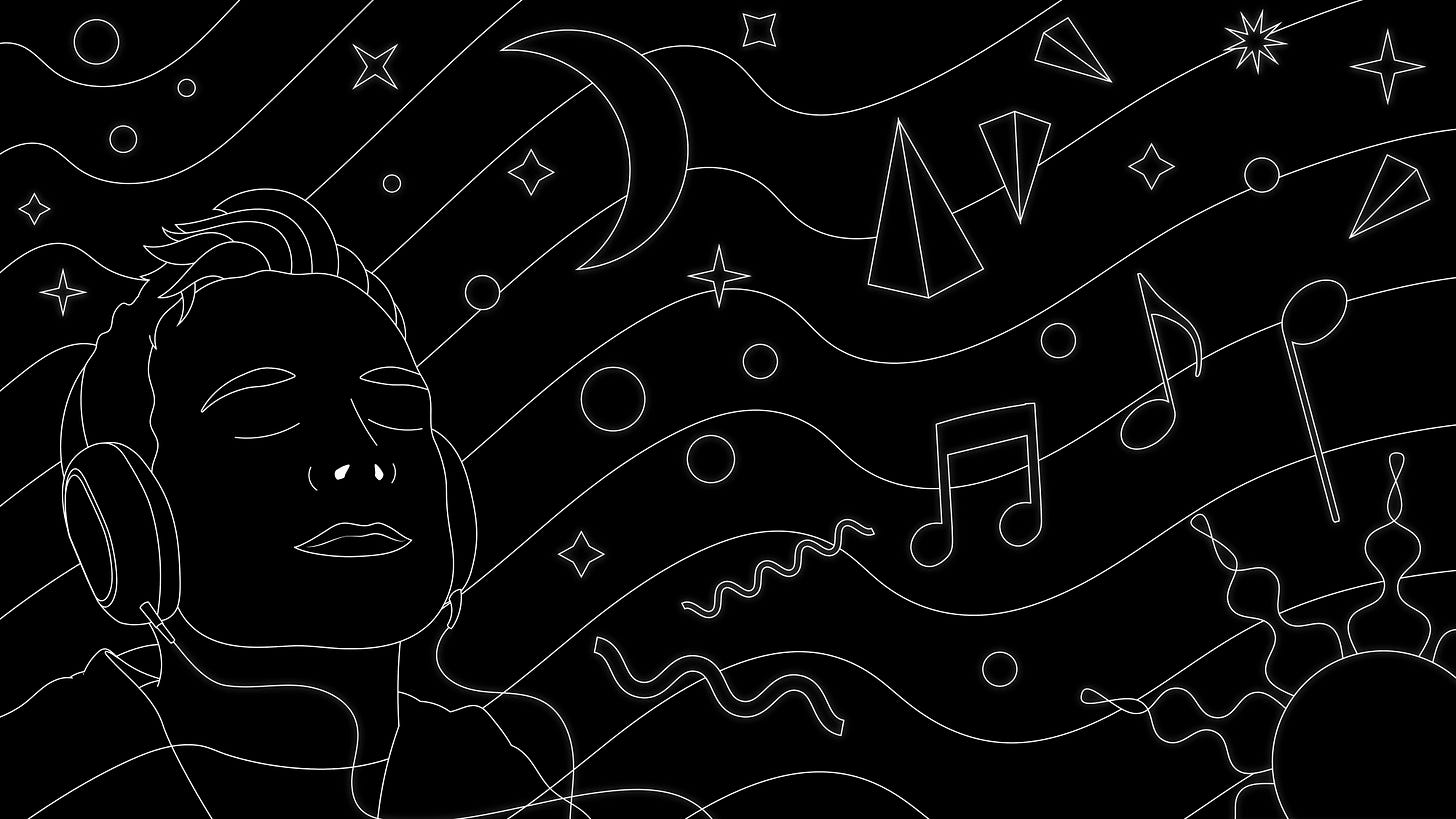First of all, I sincerely hope I’m the first person to think of this incredibly obvious headline. I discovered Endel through Sean Adams’ fantastic Drowned in Sound podcast where he interviewed two of the co-founders of the app, Oleg Stavitsky and Dmitry Evgrafov. Endel market themselves as a ‘sound wellness startup,’ creating personalised, generative soundscapes to help you focus, relax and sleep. So far, so dystopian. There were many mentions of the term functional music in the interview, which made me shudder slightly. Reducing music down to pure functionality seems to take any semblance of humanity out of it, which I always thought was the whole point of music.
However, the more I listened, the more my interest was piqued. Like many people living through the age of distraction, I find it increasingly difficult to focus without being tempted to check my email, refresh Twitter, or skim through Jo O’Meara from S Club 7’s Wikipedia page (did you know she’s released two solo albums?). I often try working with music on in the background, but that seems to make it worse. As a musician, I find passive listening very difficult. My brain keeps trying to pick out melodies or listen to lyrics until before you know it, I’m back on Jo O’Meara’s Wikipedia page. But there is one album I can always rely on to guide me into a flow state: Brian Eno’s Music For Airports. And that’s the exact album that Dmitry Evgrafov cited as the main influence behind Endel’s soundscapes. It’s even backed up by neuroscience - Endel claims that the app ‘consistently improves focus and lowers stress.’ Rather than rejecting it outright as I normally would, I decided to give it a go (and the fact that they were offering a one month free trial didn’t have anything to do with it).
I downloaded Endel the morning after I listened to the podcast. The design of the app is in perpetual dark mode, which I imagine is due to the relaxed state it is supposed to induce in the user, but I couldn’t help feeling like there was something slightly cold and sinister about it. There are three main options. First of all, there is the autoplay function, which takes data from your smartphone such as time of day, weather, heart rate, and location to deliver soundscapes that react in realtime to your daily life. Then there is a range of specific scenarios; deep work, chill, meditate, read, chores, yoga, commute, and more. Finally, there is a library of more specific mood and activity-based soundscapes, including notable collaborations with artists such as Grimes and James Blake.
I’m currently in the middle of my final major project for my graphic design MA, so I usually spend my mornings reading academic papers. I love reading, but it’s something I find very challenging. If I haven’t understood every sentence, I become anxious. If my attention drifts, I become frustrated. Academic papers are also often written in a highly inaccessible and needlessly complicated way, which only adds to the frustration. All in all, it’s not a very relaxing way to spend your morning. I decided to start with an obvious soundscape: Read. Before the soundscape started playing I was invited to set a duration; five minutes up to two hours. I selected 30 minutes, and strapped myself in for an epic robot symphony.
Every soundscape starts with the same mnemonic, which feels slightly reminiscent of the Playstation startup sound. Initially, I found it hard to read and have the music on in the background. It didn’t sound like it was made by AI at all, in fact, it sounded very human. Warm pads swirled around me while subtle motifs weaved over the top like shooting stars. After adjusting the volume to a good level, I became accustomed to the music and turned my attention back to reading. My first thought was how much calmer and less anxious I felt. Without the usual static noise constantly running through my mind, I had a newfound sense of clarity, and I could focus. I became slightly aware that the music was building to a slow climax when a gentle hand cymbal chimed. Could that have really been 30 minutes?
Mondays are a very difficult day for me. They’re usually packed with meetings, and it’s very difficult to get any work done. Before I know it, it’s the end of the day and I feel like I haven’t accomplished anything. I decided to try out another Endel soundscape: Deep Work. I set the timer for an hour. Let’s go Endel, plug me into the capitalist machine. This soundscape was a bit different. There was a sense of rhythm where there wasn’t before; a slightly odd sounding kick drum thumping consistently underneath a more detailed range of melodies. There were maybe five or six different elements all working together, heavily coated in reverb to melt everything into a semi-solid liquid. I put on my studio headphones for an even more immersive experience. Occasionally a new element would enter the mix; perhaps a water droplet, or a pentatonic piano line. It would never distract me though - it always felt expected, like welcoming an old friend you hadn’t seen in a while. I felt positive. I felt calm. I felt productive. The sounds built to a crescendo and… the hand cymbal chimed. An hour had passed. Suddenly the room felt emptier.
I felt safe in my bubble, blocked out from all the harm in the world.
I woke up the following morning to a Morning Energy Fade soundscape. I live on a fairly busy road, so I’m used to waking up to the sound of slow moving traffic, roaring motorbikes, or a man randomly screaming. Today, my usual anxiety had gone, and I felt calm and ready to start the day. I let autoplay do its thing on the way to work. As I walked to the station, the thumping kick drum played in time with my steps and I began to feel energised. On the crowded train, a baby cried next to me while its mother tried desperately to soothe it. I looked out the window at the sun reflecting off old factory building rooftops. I felt safe in my bubble, blocked out from all the harm in the world.
By the fourth day, I was listening to Endel almost constantly. I felt like I couldn’t do anything without it. The opening mnemonic began to feel a bit too familiar, inducing a feeling similar to motion sickness. I began to feel anxious when I would hear the sound building to a crescendo, fearful that the hand cymbal would chime and the room would be filled with silence once again. In some ways, I began to feel more like a machine than a human. I was more focused than I ever was, but I felt numb, like the endless soundscapes were coating a thick layer of plaster over my emotions.
On my way home from work, I had the Evening Wind Down soundscape playing as I pushed through crowds of people in the city. Suddenly, the sound began to feel overwhelming. A pang of fear stabbed my stomach and I quickly turned down an alleyway. I swiped to switch the app off, and turned on Return by Deathcrash instead. It felt like jumping into a pool of water. A wave of relief wash over me as I listened to the sound of drums, bass and guitar played by human hands. It was only then that I realised I hadn’t listened to real music for an entire week.
It is important not to be too reactionary about advances in technology, however, I also think that it is very difficult to know what you’ve lost until it’s gone.
After my initial skepticism about Endel, I now fully understand and appreciate its potential power. What would a future with AI music look like? I consider myself a music obsessive, yet Endel effectively replaced music in my life for a short period of time. In a survey I conducted into people’s listening habits, 43% of people said they mainly listen to music while they work (n=145). If Endel can create functional music that has the power to make you more productive, why wouldn’t you listen to that over human music? What if everyone decided to integrate functional music into their lives, making music made by humans more of a niche, left field art form? And how would musicians compete with this new wave of functional music? It has already been noted how some musicians are altering their songwriting in the streaming age, either by making their songs shorter, getting to the chorus within the first 30 seconds, or writing to cater to specific playlists. Would we see artists integrating AI into their songwriting process, making hour-long functional soundscapes instead of albums?
I also find Endel’s emphasis on ‘focus’ slightly unsettling. True, I was able to focus much better when using Endel, however, I can’t help feeling that using functional music as a way to enhance focus could transform us into emotionless sacks of meat whose primary function is to contribute to the economy. I am also distinctly aware that this argument is hardly a new one. Take Muzak, for example. For the uninitiated, Muzak was a company that existed from the 1930s to 2011 which provided functional music in many public spaces. At the time, many people condemned the use of Muzak in places of work, fearing it would usher in a new age of hyper-consumerism, encouraging workers to work harder and consumers to spend more. Sound familiar? 50 years on, it seems tedious that these anxieties are still ongoing. I regularly engage with music on a functional level, like when I’m running, for example. But music is all about connection - it doesn’t matter what its function is. All music has the capacity to be functional. The difference is whether it was written for that specific function or not, and in Endel’s case, it is not music but sound, and it is not written but generated, for a series of specific functions. In that sense, it is not possible to connect with it on an emotional level.
I am also aware that I am increasingly starting to sound like an old man lecturing young people on how music was better back in my day. It is important not to be too reactionary about advances in technology, however, I also think that it is very difficult to know what you’ve lost until it’s gone. I haven’t yet decided whether I’ll keep on using Endel after my free trial is over. I can certainly see a place for functional music in my life, but it could never replicate the unfiltered raw emotion that I get from human music. But who knows, maybe one day it could.
If you’re interested in trying Endel, click here to get a 1 month free trial!







Great piece. I hadn’t come across Endel before (although I have heard of Musak) and this gave me a very precise idea of what listening to it is like. Not for me, I think.